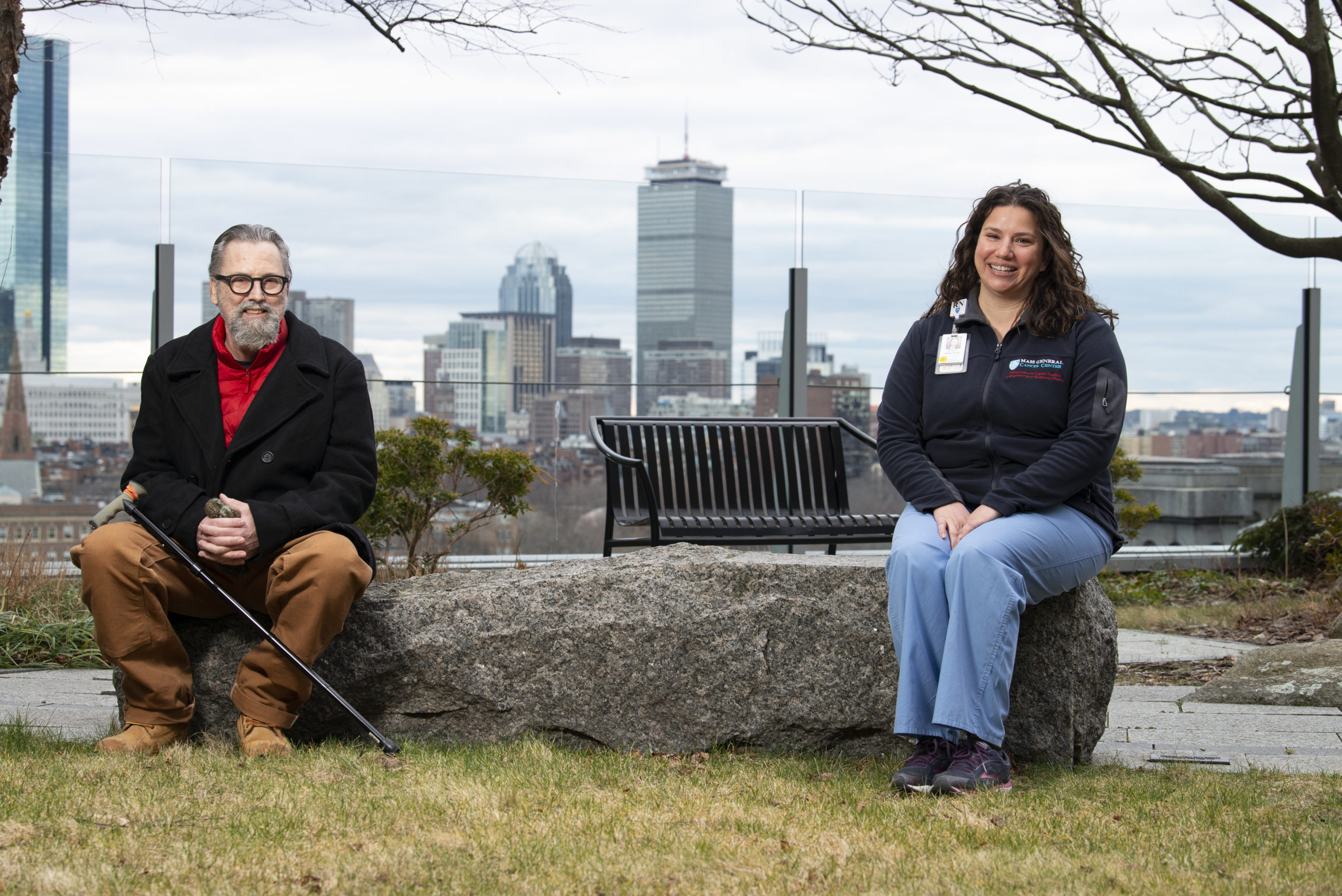On the day he was first wheeled into the Henri and Belinda Termeer Center for Targeted Therapies at the Massachusetts General Hospital Cancer Center in early 2015, Joe Sutton’s battle with cancer seemed to be at its end. The 55-year-old husband and father of two had tumors in his lungs, his liver, his groin, wrapping themselves around his ribs and spine. He’d lost almost half his normal body weight. He was so weak he couldn’t lift his head to look into the faces of the staff members gathered around his wheelchair.
Since being diagnosed with a rare and aggressive form of adrenal cancer two years earlier, Joe, a mechanical engineer from San Francisco, had been in precipitous decline. Everywhere he turned he heard the same thing: there was no data, no treatment plan, no hope for what he was facing. He had only months to live.
On a recommendation from his primary care doctor, Joe called Mass General, and a few weeks later he was being wheeled through the doors of the Termeer Center to begin a clinical trial. Termeer Center Director Dejan Juric, MD, and his team were there to meet him — and one by one, they each bent down and introduced themselves.
“Dr. Juric looked me in the eye, took my hand and said — don’t worry. We’ve got you,” says Joe, now 61.
Precision Progress
For decades, clinical trials were considered the last option for most cancer patients. A hail Mary. Pharmaceutical roulette.

“Oncologists were sometimes chastised for enrolling patients in clinical trials, because it was more about collecting data than about helping patients,” Dr. Juric says. But things changed with the advent of precision medicine. Recent advances have made it possible to identify the genetic mutations driving an individual’s cancer and select therapeutics to target and inhibit those specific mutations.
“That means we can predict the response to therapy and enroll patients we suspect will benefit,” Dr. Juric says. “Our intent, from the beginning, is therapeutic — to help every patient we treat and this approach increases the odds of success.” The Termeer Center was founded in 2012 to offer patients access to the best and most advanced experimental treatments available, including targeted therapies and immunotherapies.
In Joe’s case, Dr. Juric and his team selected two agents designed to regulate his body’s immune response to cancer. The effect was dramatic. Within weeks, his appetite returned and he started gaining weight. Two months after starting treatment imaging scans revealed Joe’s tumors had reduced by 40%.
“The most beautiful moments in my professional life have come after giving patients a new drug or combination for the first time and seeing how the tumor has melted away,” Dr. Juric says. “When that happens, you’re happy for the patient; and you’re happy because together you’ve figured out a little piece of the puzzle as to how that cancer works, and that could make a difference for others. The secret to conducting these trials is to recognize the patient as a partner.” In the last decade, Mass General Cancer Center studies have led to the approval of 22 new therapeutic agents by the FDA.
‘The Best Decision I Ever Made’
While the chances of success have increased in today’s clinical trials, so too have the demands on patients’ time. Imaging studies, blood work, tissue samples and other assessments are often required.
“It’s been an incredible gift to watch my daughters grow up. The Termeer Center is the best decision I ever made.”
“We’re almost monitoring our patients in real time and that’s not always easy,” says Donna Fitzgerald, PA-C, advance practice provider in the Termeer Center. “But they know treatment decisions are based on who they are and what the science says. It’s not just about the next milestone, it’s about the whole journey — and we’re here for them every step of the way.”
Once a week for two and a half years, Joe — no longer needing his wheelchair — would take the red-eye from San Francisco arriving at Logan Airport at dawn, spend the day getting his infusions and fly back home that night. With the help of his family — wife Susan and daughters Ally and Harper — and friends, he never missed a treatment.
“At the beginning, I was afraid the trial might rob him of the time he had left with his daughters,” says Katie Somers, RN, who met Joe the day he arrived and became his primary nurse in the Termeer Center. “Now he’s the barometer I use for all my patients. He showed me what quality of life really means.”
Eventually, Joe’s cancer returned, and the trial was halted. Today Joe — who is currently staying at Mass General’s Beacon House to be closer to his care team during the pandemic — is participating in his fourth clinical trial under Dr. Juric. One day, Joe says, he hopes his contribution to research will help another patient experience the “Joe Sutton effect.”
“In 2013 while still in San Francisco, I was told to get my affairs in order which prompted me to come to Boston. Here it is, 2021 — I’m still here thanks to Termeer,” Joe says. “It’s been an incredible gift to watch my daughters grow up. The Termeer Center is the best decision I ever made.”
For more information on how to support the Termeer Center, please contact us.

